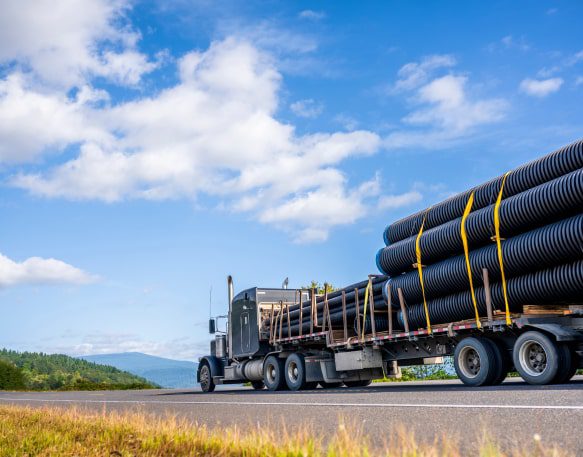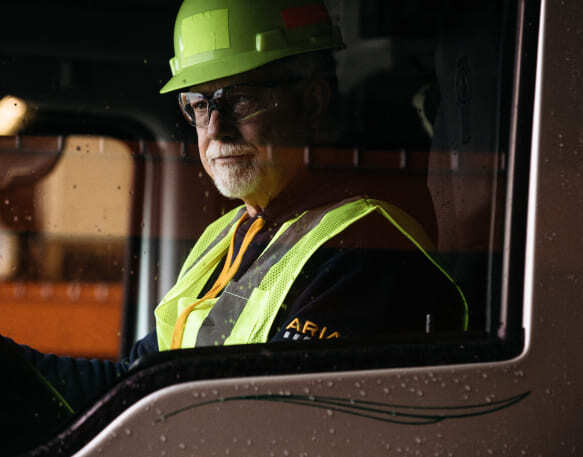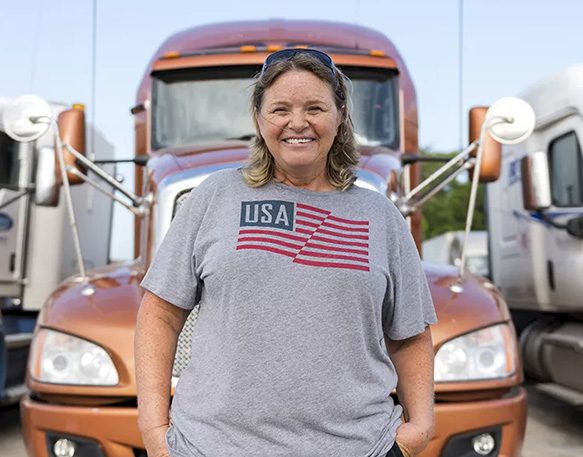If you’ve been considering entering into a different sector within the trucking industry and want to learn more about how to become a heavy haul truck driver, follow this guide to get a breakdown of what heavy haulers do, the type of equipment used, and the steps you’ll need to take to start your own heavy haul trucking business.
What is heavy haul trucking?
In this segment of the trucking industry, heavy haul carriers are relied upon to transport large or oversized loads using an assortment of equipment — but what exactly counts as a “heavy haul”? The U.S. Department of Transportation Federal Highway Administration (FHWA) lists the maximum sizes for standard shipments, so any freight that exceeds these numbers may be classified as a heavy load:
- Width: 8’6″
- Length: 53′
- Single Axle Weight: 20,000 lbs
- Tandem Axle Weight: 34,000 lbs
- Gross Vehicle Weight: 80,000 lbs
Other factors are dependent on the state, the type of specialized equipment being used — such as saddlemount combinations or dromedary — and the type of freight being transported, such as automobiles, planes, or boats. For example, any freight height over 13’6″ may be categorized as oversized, but since there is no federal guideline to follow, truckers must confirm on the state level what constitutes an oversized load and get the appropriate permits needed.
For truckers looking to expand their skill set, becoming a heavy haul trucker offers the best opportunity to handle an array of rig types, cargo, and logistical situations. Depending on the class and size of the load being transported, special routes may need to be taken, and escort services may even need to be involved, making heavy hauling one of the more challenging but rewarding areas within the trucking industry.
Types of heavy haul freight
Heavy hauling is an exciting segment of the trucking industry to be a part of because no two loads are alike. One job may require a carrier to deliver industrial equipment to a rural area and the next a group of automobiles through a highly compact city. Other examples of the various freight that heavy haulers might carry include:
- Construction Equipment
- Bulldozers
- Power Transformers
- Wind Turbines / Propellers
- Cranes
- Broilers
- Bailers / Harvesters
- Industrial Equipment
- Timber or Piping
- Pre-built Homes
- Boats
- Planes
Standard rigs used in heavy duty hauling
Given the diverse cargo carriers transport, a heavy hauler must choose the best rig to get the job done based on its overall functionality and capabilities. For that reason, you are likely to see the trailers listed below carrying oversized hauls:
- Removable goosenecks (RGN): These specialized trailers have a detachable front and can be lowered to the ground to create a ramp, making it easier for motorized freight such as bulldozers to be easily driven onto the trailer. RGN trailers can support up to 42,000 lbs, but additional axles allow upscaling to 150,000 lbs.
- Flatbeds: Flatbed trailers are open trucks with no roof or walls. This configuration makes it easier for loaders to navigate the trailer and is ideal for hauling logs of timber, pipes, and wide loads. They come in various sizes, with the most common being between 48′ and 53′, with a maximum weight limit of 48,000 lbs.
- Double drops: Also known as a lowboy, double drop trailers are used to accommodate taller cargo such as construction equipment and typically have the capacity to haul between 42,000 and 45,000 lbs before needing a permit.
- Step decks: Also known as a drop deck, these trailers are similar in use cases to double drops as they’re used to carry taller, heavy-duty freight, such as cranes. A step deck can generally hold a load of around 48,000 lbs.
By understanding the various types of rigs that can be used, a heavy haul trucker can identify which is best for their needs to make transporting their next load easier, safer, and more efficient.
How much do heavy haul truck drivers make?
Due to the labor intensity, safety precautions, and high skill level needed to move oversized freight cautiously while still meeting deadlines, heavy haul truck drivers can be expected to earn a competitive salary. The national average sits at $56,000 a year, or $27 an hour, but seasoned drivers with special licensing working with the right company may have the potential to break past the six-figure mark.
Determining the price of transporting an oversized load involves calculating the presence of several factors. Some of these can include:
- Permits needed: Every state requires heavy load truckers to carry a permit specific to each load. When you get a new oversized load, you’ll need to acquire a new permit.
- Freight dimensions: The dimensions of the load being carried factor into the risks involved in moving it, as well as the type of equipment being used.
- Type of equipment: Depending on the size of the load, a heavy haul trucker must determine which rig is suitable for the journey.
- Distance: Short distances will naturally charge less than other transports traveling across the country.
- Added labor: Some oversized loads may require additional labor to haul, including escorts, navigating power lines or rough terrain, and other logistical maneuvers needed to deliver the freight safely.
How to start a heavy haul trucking business
Now that you have an idea of the types of work and equipment you will be using for oversized transport, the next stage is becoming a heavy hauler and — if you plan to start your own trucking business — ensuring your trucking operation gets off to the right start before you begin specializing in hauling heavy loads.
Establishing a business plan
The most crucial step for any business is having a solid business plan in place. Set your business up for success by researching the market and understanding how you’ll arrange financing for the equipment and other operating materials you’ll need, such as fuel, permits, and more.
If you’re planning to operate across state lines, you’ll need to secure a motor carrier authority and obtain a motor carrier (MC) number. The experts at the DAT Copilot™ Authority Program proudly help drivers looking to become independent by obtaining their DOT registration, MC number, and any federal or state permits needed on their behalf. This allows business owners to focus on growing their operations instead of dealing with the hassle of paperwork.
Licensing & federal regulations
Becoming a trucker of any kind requires having a commercial driver’s license (CDL). You can obtain yours by attending a private driving school or, in some cases, trucking companies can offer to sponsor you to attend a CDL course. We recommend doing some research on which option is suitable for you and your needs.
Once you’ve gotten your CDL, it’s time to pass the Federal Motor Carrier Safety Regulation (FMCSR) exam. This involves getting a medical exam by a licensed examiner, which will be valid for up to 24 months from approval. The second half of the exam will be a written portion testing your knowledge of the federal traffic laws.
Understanding heavy haul permits
An essential skill to being a successful heavy haul operator is proficiently communicating with authorities to attain a movement permit. These are required to transport oversized loads and are only valid for a limited period for the specific freight you’re carrying. These permits dictate during what times a carrier is allowed to operate within state, municipal, and county restrictions. They also determine if escorts/guide cars are mandatory for the load size and, if so, how many, as well as other types of requirements, including signage, safety flags, banners, and flashing lights.
Finding the best heavy haul loads
Once you have the licensing, insurance, and equipment you need to start, you’ll need to find some high-quality loads to move. By using the DAT heavy haul load board, you’ll be using one of the biggest load boards in the U.S., giving you access to the more than 500 million loads posted to our boards annually. And with the most up-to-date market prices, you’ll know exactly how much to charge per freight while finding the right loads from trusted companies across the nation.
Hit the fast lane with DAT Freight & Analytics
If you’re ready to hit the road and move into the challenging yet rewarding career of being a heavy haul trucker, the experts at DAT will help you make the most of your time. As trucking’s largest, on-demand freight marketplace, our team offers the tools, expertise, and solutions to help you make it in the trucking industry. Whether you’re looking to drive for a company or want to become an owner-operator, DAT has helped thousands of carriers, shippers, and brokers meet — and exceed — expectations across the nation.
Navigate the ins and outs of starting a business with DAT!
Paperwork can be confusing for anyone who’s never had to deal with all the red tape that comes with starting a heavy haul trucking business.
When you get the DAT Copilot™ Authority Program, we’ll handle the forms so you can concentrate on growing your business.
Sign up today to get started!




